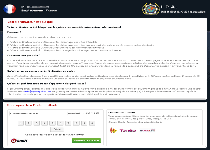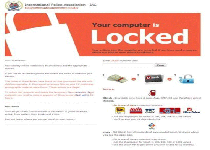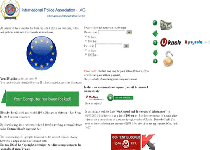International Police Association (I.P.A.) Ransomware
Posted: July 23, 2012
Threat Metric
The following fields listed on the Threat Meter containing a specific value, are explained in detail below:
Threat Level: The threat level scale goes from 1 to 10 where 10 is the highest level of severity and 1 is the lowest level of severity. Each specific level is relative to the threat's consistent assessed behaviors collected from SpyHunter's risk assessment model.
Detection Count: The collective number of confirmed and suspected cases of a particular malware threat. The detection count is calculated from infected PCs retrieved from diagnostic and scan log reports generated by SpyHunter.
Volume Count: Similar to the detection count, the Volume Count is specifically based on the number of confirmed and suspected threats infecting systems on a daily basis. High volume counts usually represent a popular threat but may or may not have infected a large number of systems. High detection count threats could lay dormant and have a low volume count. Criteria for Volume Count is relative to a daily detection count.
Trend Path: The Trend Path, utilizing an up arrow, down arrow or equal symbol, represents the level of recent movement of a particular threat. Up arrows represent an increase, down arrows represent a decline and the equal symbol represent no change to a threat's recent movement.
% Impact (Last 7 Days): This demonstrates a 7-day period change in the frequency of a malware threat infecting PCs. The percentage impact correlates directly to the current Trend Path to determine a rise or decline in the percentage.
| Ranking: | 19,237 |
|---|---|
| Threat Level: | 7/10 |
| Infected PCs: | 1,070 |
| First Seen: | July 24, 2012 |
|---|---|
| Last Seen: | March 7, 2025 |
| OS(es) Affected: | Windows |
 The International Police Association (I.P.A.) Virus is a ransomware Trojan from the LockScreen family, and, like all members of this group, attempts to lock your PC and request a ransom payment via Ukash to regain computer access. While the International Police Association (I.P.A.) Virus's characteristic warning message claims to be a notification from the IPA regarding illegal file-trafficking and other Internet misdeeds, the International Police Association (I.P.A.) Virus, as illegal software, has no connection with that organization, and you should regard all online crime-related warnings from an International Police Association (I.P.A.) Virus pop-up as fraudulent. Rather than paying the Ukash fine that the International Police Association (I.P.A.) Virus recommends for your PC's restoration, SpywareRemove.com malware experts suggest that you delete an International Police Association (I.P.A.) Virus with reputable anti-malware programs that are designed to deal with ransomware Trojans like the International Police Association (I.P.A.) Virus and related PC threats.
The International Police Association (I.P.A.) Virus is a ransomware Trojan from the LockScreen family, and, like all members of this group, attempts to lock your PC and request a ransom payment via Ukash to regain computer access. While the International Police Association (I.P.A.) Virus's characteristic warning message claims to be a notification from the IPA regarding illegal file-trafficking and other Internet misdeeds, the International Police Association (I.P.A.) Virus, as illegal software, has no connection with that organization, and you should regard all online crime-related warnings from an International Police Association (I.P.A.) Virus pop-up as fraudulent. Rather than paying the Ukash fine that the International Police Association (I.P.A.) Virus recommends for your PC's restoration, SpywareRemove.com malware experts suggest that you delete an International Police Association (I.P.A.) Virus with reputable anti-malware programs that are designed to deal with ransomware Trojans like the International Police Association (I.P.A.) Virus and related PC threats.
International Police Association (I.P.A.) Virus: a Crooked Cop That's Ticketing You with False Accusations
As a member of the LockScreen family, the International Police Association (I.P.A.) Virus (or Trojan:Win32/LockScreen.CI) operates on the same methodology as the Ukash family and similar Trojans that are particularly widely-distributed throughout Europe. Similar ransomware Trojans include West Yorkshire Ransomware, the Gema 'Access to your computer was denied' Virus and'Votre ordinateur est bloqué' Belgium Ransomware. Like similar PC threats, International Police Association (I.P.A.) Virus is designed to display a misleading criminal alert that accuses your PC of being used for child pornography, illegal music-trafficking and similarly illegal purposes. However, SpywareRemove.com malware researchers emphasize that International Police Association (I.P.A.) Virus warnings are wholly fabricated and should be disregarded as malicious, inaccurate and illegal.
While it displays this pop-up alert, the International Police Association (I.P.A.) Virus will also prevent you from accessing your desktop or other applications. The International Police Association (I.P.A.) Virus's pop-up may also be selected to tailor itself to the infected computer's country based on its IP address, with an appropriate shift in language and references to regional law agencies, similar to the strategy of the Ukash Virus Family's series of ransomware Trojans). Unlike the Ukash Virus Family, however, the International Police Association (I.P.A.) Virus only gives a Ukash payment option without a Paysafecard alternative – although SpywareRemove.com malware experts discourage you from paying the International Police Association (I.P.A.) Virus's requested fine in any case.
Firing the International Police Association (I.P.A.) Virus from Its Beat
As a Lockscreen-based ransomware Trojan that prevents you from using other programs, the International Police Association (I.P.A.) Virus is harmful and should be removed as soon as it's practical for you to do so. SpywareRemove.com malware research team also recommends that you try to disable International Police Association (I.P.A.) Virus – for example, by loading Windows from a USB drive – as a first step in accessing the anti-malware software that can remove International Police Association (I.P.A.) Virus without risking harm to your PC.
Although International Police Association (I.P.A.) Virus's characteristics can be tweaked to suit attacks against virtually any country, SpywareRemove.com malware analysts have, so far, noted that International Police Association (I.P.A.) Virus's attacks have been restricted to certain regions in Europe. So far, targets of International Police Association (I.P.A.) Virus attacks include Germany, Greece, Belgium, Sweden, Portugal and various others, although primary English-speaking countries (the United King and United States) appear to be exempt for the moment.
Use SpyHunter to Detect and Remove PC Threats
If you are concerned that malware or PC threats similar to may have infected your computer, we recommend you start an in-depth system scan with SpyHunter. SpyHunter is an advanced malware protection and remediation application that offers subscribers a comprehensive method for protecting PCs from malware, in addition to providing one-on-one technical support service.
* See Free Trial offer below. EULA and Privacy/Cookie Policy.
Why can't I open any program including SpyHunter? You may have a malware file running in memory that kills any programs that you try to launch on your PC. Tip: Download SpyHunter from a clean computer, copy it to a USB thumb drive, DVD or CD, then install it on the infected PC and run SpyHunter's malware scanner.


Technical Details
File System Modifications
Tutorials: If you wish to learn how to remove malware components manually, you can read the tutorials on how to find malware, kill unwanted processes, remove malicious DLLs and delete other harmful files. Always be sure to back up your PC before making any changes.
The following files were created in the system:%SystemDrive%\BOS\bos.exe
File name: bos.exeSize: 3.58 KB (3584 bytes)
MD5: 89ab457a095168e102c60837aca51327
Detection count: 9
File type: Executable File
Mime Type: unknown/exe
Path: %SystemDrive%\BOS
Group: Malware file
Last Updated: July 24, 2012
More files
Registry Modifications
Regexp file mask%SystemDrive%\BOS\bos.exe
Leave a Reply
Please note that we are not able to assist with billing and support issues regarding SpyHunter or other products. If you're having issues with SpyHunter, please get in touch with SpyHunter customer support through your SpyHunter . If you have SpyHunter billing questions, we recommend you check the Billing FAQ. For general suggestions or feedback, contact us.